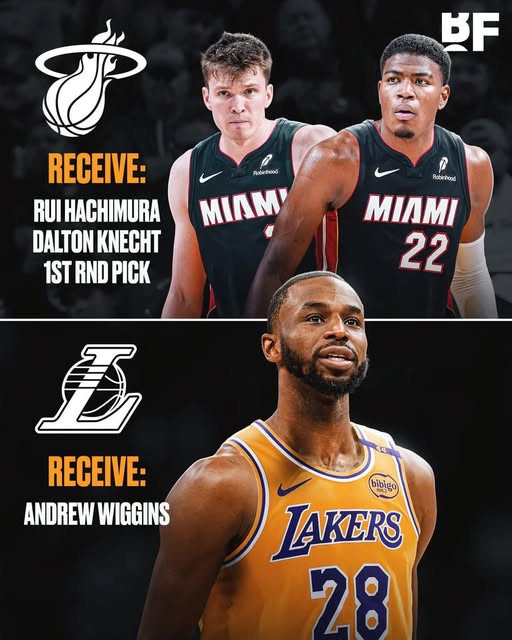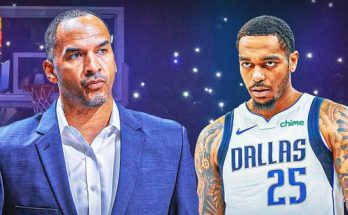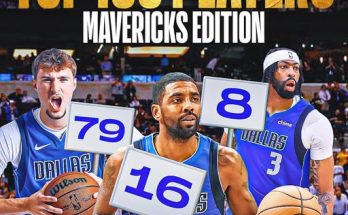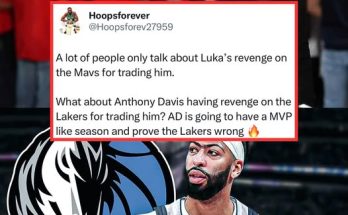The NBA trade market is always full of drama, tension, and surprises, but few stories have captured the attention of fans and analysts quite like the saga surrounding Andrew Wiggins and the Miami Heat. As the Los Angeles Lakers have expressed interest in acquiring Wiggins, the Heat have set a sky-high price, making negotiations a complex and intriguing chess game. The dynamic between these two teams and the player at the center of it highlights how valuable Wiggins has become in today’s NBA and underscores Miami’s determination to hold onto a key piece of their roster.
Andrew Wiggins’ journey in the NBA has been nothing short of remarkable. Originally the first overall pick in the 2014 NBA Draft by the Cleveland Cavaliers, Wiggins’ career was met with a fair share of skepticism early on. Though immensely talented and athletic, many questioned his consistency and impact on winning teams. However, his trade to the Golden State Warriors marked a turning point. With the Warriors, Wiggins embraced a new role, becoming a reliable two-way player, showing defensive prowess, and contributing to the team’s championship run in 2022. His transformation from a scorer with questions to a dependable all-around player earned him newfound respect across the league.
The Miami Heat acquired Andrew Wiggins in a blockbuster trade, hoping to bolster their roster with a versatile wing who could defend multiple positions and score efficiently. Wiggins’ ability to blend offense and defense made him a perfect fit for Miami’s tough, physical style of play. He has since become a key contributor on the Heat’s roster, helping them maintain their status as perennial contenders in the Eastern Conference. His value to the Heat transcends the box score; his experience, leadership, and ability to perform in clutch moments are invaluable.
Meanwhile, the Los Angeles Lakers have been looking for ways to improve their roster as they aim to maximize the championship window for their superstar duo, LeBron James and Anthony Davis. The Lakers have had their share of roster construction challenges over the past few seasons, and acquiring a player like Wiggins, who can stretch the floor, defend elite wings, and bring championship experience, is an attractive proposition. Wiggins’ skill set complements the Lakers’ current roster, offering a versatile option to support their stars and improve team defense without sacrificing offensive firepower.
However, Miami’s valuation of Andrew Wiggins has complicated the Lakers’ pursuit. The Heat, known for their shrewd front office and strategic roster building, understand the significance of Wiggins on their team and are unwilling to part with him easily. Miami’s front office has made it clear that any potential trade for Wiggins will come at a premium. This high asking price is a testament to Wiggins’ importance to the Heat’s success and Miami’s confidence in their ability to compete at the highest level with him on the roster.
The asking price reportedly includes a combination of promising young players, future draft picks, and possibly established veterans. Miami’s front office is demanding assets that will not only replace Wiggins’ contributions but also help sustain their competitiveness for years to come. This pricing strategy has put the Lakers in a challenging spot, as they must weigh the cost of acquiring Wiggins against their broader team-building goals and salary cap constraints.
From the Lakers’ perspective, acquiring Wiggins could be a game-changer. His defensive versatility would alleviate pressure on Anthony Davis and LeBron James, allowing them to focus more on their offensive strengths. Wiggins’ ability to score from the perimeter and drive to the basket adds another dimension to the Lakers’ offense, potentially opening up the floor for their stars to operate with more freedom. Moreover, Wiggins’ championship experience with the Warriors aligns well with the Lakers’ aspirations to return to the NBA Finals and contend for a title.
However, the trade negotiations remain delicate. The Lakers must consider whether the assets required by Miami to acquire Wiggins justify the potential upgrade. Trading promising young talent or high draft picks could limit the Lakers’ future flexibility and depth, especially as LeBron James and Anthony Davis age. Additionally, the Lakers need to ensure any trade fits within the NBA’s salary cap rules, further complicating the financial aspect of the deal.
On the other hand, Miami’s insistence on a high return for Wiggins is also a strategic move to maximize value. The Heat are known for their ability to identify undervalued players and develop them into key contributors, but Wiggins’ market value has surged thanks to his recent performances and championship pedigree. By demanding a significant return, Miami signals to the league that they see Wiggins as an integral part of their present and future success. This stance could also deter some teams from engaging in trade talks, giving Miami leverage in negotiations.
The Heat’s broader roster strategy is worth considering here. Miami has a core group of players that they believe can compete for championships now, and Wiggins fits perfectly into that picture. Trading him away without receiving significant compensation could disrupt their chemistry and weaken their competitive edge. At the same time, Miami must balance the immediate goal of winning with long-term roster sustainability. High draft picks or young players acquired in a trade could help them maintain that balance.
Fan reactions to this unfolding story have been mixed. Lakers fans are eager to see a move that improves their chances of winning now, and Wiggins is widely seen as a valuable addition. Meanwhile, Heat fans are hopeful that their front office will hold the line and either keep Wiggins or extract maximum value in return. The media has been abuzz with speculation, rumors, and analysis, highlighting the significance of this potential trade for both franchises.
The timing of these discussions also plays a critical role. The NBA offseason and trade deadline periods often see heightened activity as teams position themselves for playoff success. Both Miami and Los Angeles have strong incentives to resolve this matter sooner rather than later to allow for team chemistry to develop and strategic planning for the upcoming season. Delays or prolonged negotiations could create uncertainty that affects player morale and team focus.
Another layer to consider is Andrew Wiggins’ own perspective. While trade discussions are largely driven by front office decisions, the player’s preferences and willingness to join a new team can influence the process. Wiggins has expressed a professional attitude about his role and contributions, but the prospect of playing for the Lakers, a high-profile franchise with championship aspirations, could be enticing. Conversely, Wiggins has also found success and respect in Miami, which could make him more inclined to stay if the Heat demonstrate their commitment to building a winning team around him.
The salary cap situation for both teams adds complexity to the negotiations. The Lakers, operating under certain financial constraints due to their star players’ contracts, must carefully manage their payroll to avoid luxury tax penalties while assembling a competitive roster. Miami, with its own salary cap considerations, must weigh the cost of retaining Wiggins against their plans to pursue other key players or free agents. This balancing act is a delicate art in today’s NBA, where financial prudence can dictate roster decisions as much as on-court performance.
Ultimately, the saga of Andrew Wiggins’ potential trade from Miami to the Lakers encapsulates the intricate dynamics of modern NBA team-building. It is not just about swapping players; it involves strategy, financial management, player development, and the pursuit of championships. The Heat’s high asking price signals their belief in Wiggins’ value and their intent to keep him or get a return commensurate with his worth. The Lakers’ interest reflects their ongoing quest to surround their stars with the best supporting cast possible.
As this story continues to develop, NBA fans will be watching closely. A trade involving Andrew Wiggins would have ripple effects throughout the league, impacting playoff races, team strategies, and even future trades. It is a reminder that the NBA is a constantly evolving landscape, where player movement can reshape the balance of power overnight.



